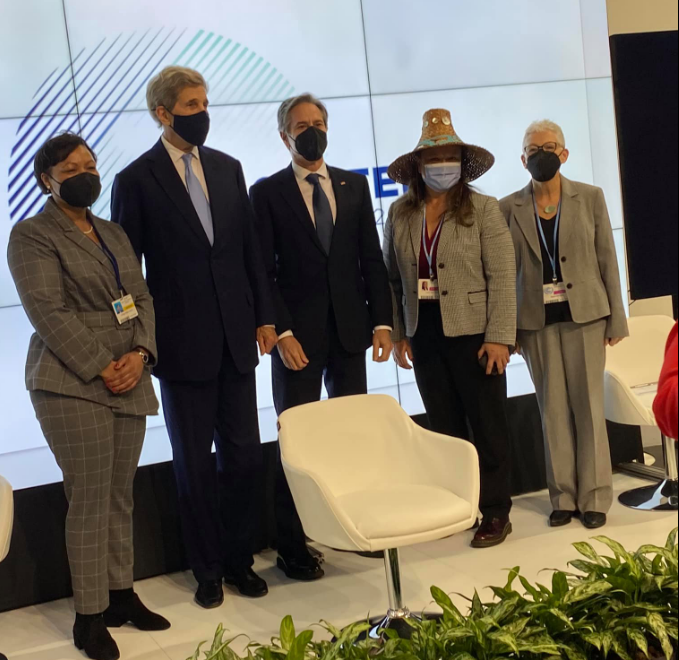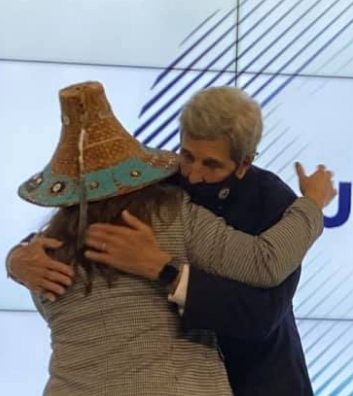
- Details
- By Native News Online Staff
The U.S. Department of State on Wednesday announced National Congress of American Indians (NCAI) President Fawn Sharp has been credentialed as a delegate during the 26th United Nations Climate Change Conference of the Parties (COP26) that is currently in session in Glasgow, United Kingdom.
Sharp becomes the first tribal leader elected exclusively by tribal citizens to receive diplomatic recognition in history from the United States.
Want more Native News? Get the free daily newsletter today.
"As I accept the honor of being the first tribal leader to receive full credentials as a delegate to the United Nations Conference of Parties, I do so with an incredible sense of optimism, because I know the invaluable contributions to the fight against Climate Change that Native Americans and our Indigenous relatives globally will make to turn the tide," Sharp said.
The international COP26 summit that began on Sunday in Glasgow comes at a critical juncture where all nations and communities must find consensus to address one of the world’s climate crisis.

Tribal nations and Indigenous communities globally have a different and unique sense of land and place rooted in, and often dependent upon, their environment and local natural resources for cultural practices, traditions, community, food, economies, and ways of life.
“It is impossible to confront the global existential crisis of climate change without the active leadership and engagement of the world's Indigenous peoples, and the Tribal Nations of the United States of America have an incomparable brain trust of leaders, scientists, and policymakers who are ready to lead that effort,” Sharp said. "Indigenous communities globally have one thing in common: we are resilient survivors, and we will help lead the world through this challenge to a brighter, more just, and more sustainable future."
In April 2021, Sharp joined world leaders at the White House Leaders Summit on Climate that highlighted the dramatic effects of climate change on tribal nations and the importance of tribal sovereignty and traditional knowledge in combating those effects.
Sharp, who currently serves as vice president of the Quinault Indian Nation in Taholah, Washington, after serving for five terms as president of the tribal nation. She was elected as president of NCAI in Denver in October 2018 at its 75th annual conference and was re-elected this fall to serve another two-year term.
Sharp will be in attendance at the COP26 Summit through its conclusion on November 12, 2021. In addition to being credentialed by the U.S. State Department through the remainder of the summit, she is leading an Indigenous delegation advocating on behalf of tribal nations.
More Stories Like This
50 Years of Self-Determination: How a Landmark Act Empowered Tribal Sovereignty and Transformed Federal-Tribal RelationsNavajo Nation Council Members Attend 2025 Diné Action Plan Winter Gathering
Ute Tribe Files Federal Lawsuit Challenging Colorado Parks legislation
NCAI Resolution Condemns “Alligator Alcatraz”
NABS Documents 134 More Survivor Stories, Expands Digital Archive in 2025
Help us defend tribal sovereignty.
At Native News Online, our mission is rooted in telling the stories that strengthen sovereignty and uplift Indigenous voices — not just at year’s end, but every single day.
Because of your generosity last year, we were able to keep our reporters on the ground in tribal communities, at national gatherings and in the halls of Congress — covering the issues that matter most to Indian Country: sovereignty, culture, education, health and economic opportunity.
That support sustained us through a tough year in 2025. Now, as we look to the year ahead, we need your help right now to ensure warrior journalism remains strong — reporting that defends tribal sovereignty, amplifies Native truth, and holds power accountable.
 The stakes couldn't be higher. Your support keeps Native voices heard, Native stories told and Native sovereignty defended.
The stakes couldn't be higher. Your support keeps Native voices heard, Native stories told and Native sovereignty defended.
Stand with Warrior Journalism today.
Levi Rickert (Potawatomi), Editor & Publisher

